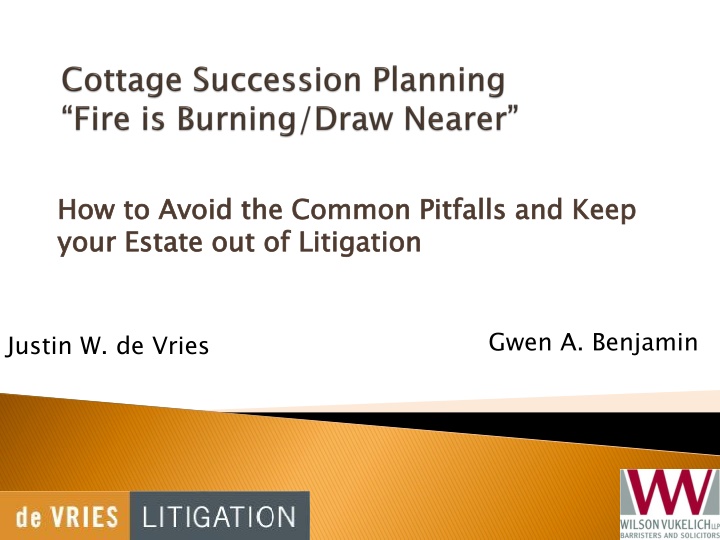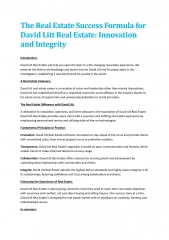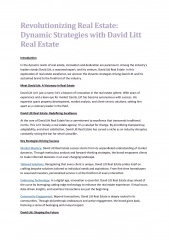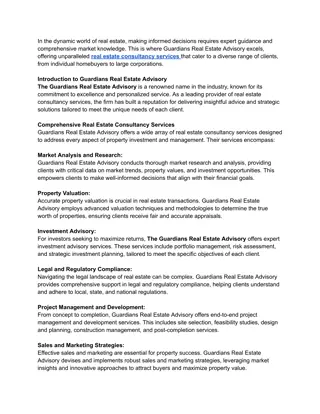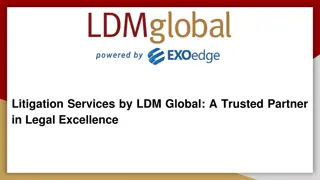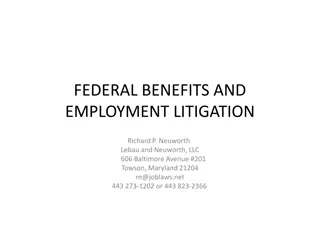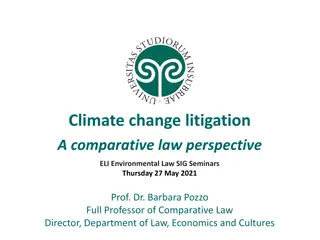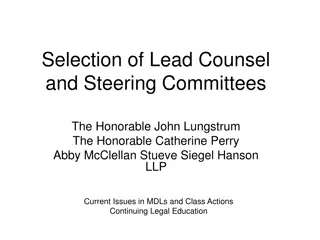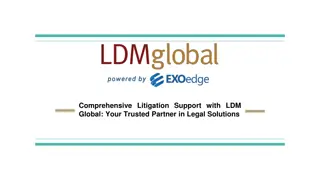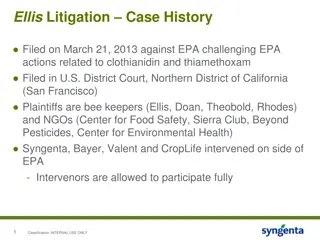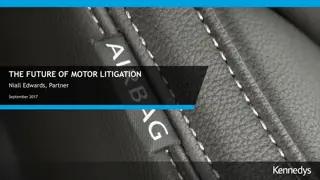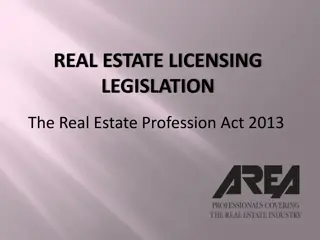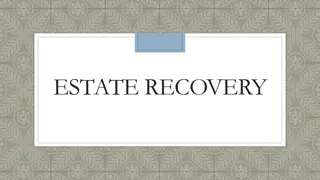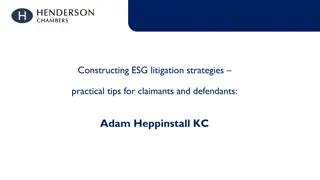Avoid Common Pitfalls: Keep Estate out of Litigation
Planning your estate is crucial to avoid potential legal battles among your heirs. Learn how to sidestep common pitfalls and maintain harmony in your family after you're gone. This guide offers expert advice on securing your estate, ensuring a smooth transition, and protecting your assets. By implementing the strategies outlined in this book, you can safeguard your legacy and prevent costly disputes that may arise during the probate process.
Download Presentation

Please find below an Image/Link to download the presentation.
The content on the website is provided AS IS for your information and personal use only. It may not be sold, licensed, or shared on other websites without obtaining consent from the author.If you encounter any issues during the download, it is possible that the publisher has removed the file from their server.
You are allowed to download the files provided on this website for personal or commercial use, subject to the condition that they are used lawfully. All files are the property of their respective owners.
The content on the website is provided AS IS for your information and personal use only. It may not be sold, licensed, or shared on other websites without obtaining consent from the author.
E N D
Presentation Transcript
How to Avoid the Common Pitfalls and Keep your Estate out of Litigation How to Avoid the Common Pitfalls and Keep your Estate out of Litigation Gwen A. Benjamin Justin W. de Vries
Wait Until Death and Leave discretion to the Executors Direct that the cottage be sold by the Executors Gift the cottage to one or more children Create a trust for the cottage with a maintenance fund for one or more children Delay distribution for some period of time so that the children can decide and during that period hold in trust Donate it to a charity approved by the Minister of the Environment
Deal with it during lifetime Gift to a child or children Sale to a child or children at full value or for lesser value Retain a life interest and gift residual interest Transfer to an inter vivos trust; family trust, joint partner trust, alter ego trust Transfer to a not for profit corporation Donate it to a charity approved by the Minister of the Environment
Even if you consider a cottage spousal rollover, issues surrounding the cottage will continue to fester Address them as a family. Do not let your spouse deal with the difficult decisions alone Blended Families are common your spouse may remarry, your children may divorce and remarry other people
Talk to your children (preferably at the same time). Some children may want the cottage, some may want to sell it. You may be surprised by how they feel Capital gains tax: Who will pay? Seek professional advice
No matter whether disposed of during lifetime or on death: Increase in fair market value will be taxed on death or earlier disposition unless cottage passes to a spouse, spouse or common law partner trust, alter ego, joint partner or unless the principal residence exemption is available If exemption not available, estate/owner may not have the liquidity to pay the tax. How will tax bill be funded? of joint spousal trust rollover and/or principal residence
Consider whether the whole qualify as a principal residence: If property exceeds hectare - is the remaining property necessary for the use and enjoyment of the housing unit as a residence? Cassidy v. R. 2011 DTC 5160 Federal Court of Appeal Part of land is rental e.g. Mavis v. Mavis 2005 CarswellOnt 1649 Ontario Superior Court of Justice Remember there are two principal residence exemptions until 1982 whole property will
Leaving it up to the Executor: How much discretion do we give the Executor? Retallack (Trustee of) v. Retallack 2014 ONSC 6430 Application for directions by the executor Interpretation of clause permitting the trustee to make any division of the estate and to fix the value of the estate for the purposes of division in the face of a clause dividing the estate equally. Even hand rule not ousted 1.
Does the clause give the Executor the discretion to determine the date of valuation of a cottage and the value at which beneficiaries take the cottage? Intention was to divide the estate equally between the five children and they should share in any increase in value since death.
Valuation should generally be date of distribution, not date of death (Ruddenham, Re (1971) 2 NSR (2d) 729 (NSCA); Fray v. Evans 2013 ONCA 776 (Ont CA)
2. Directing that the cottage be sold to third parties by Executors should the beneficiaries have a right of first refusal? 3. Gifting cottage to one or more Beneficiaries Residue of the estate bears the burden of the tax liability unless it is stated otherwise Should contents of the cottage also be gifted?
Consider use of a hotchpot clause to equalize the residuary beneficiaries Are there enough other assets in the estate to equalize? What happens when the value of the cottage exceeds the beneficiary s interest in the residue? If gifted to more than one Beneficiary, is the cottage to be held in joint tenancy or tenancy in common? Subject to contrary intention, generally presumption of tenancy in common Watch out for statutory anti-lapse provisions in the event that a beneficiary predeceases testator Should the Testator require a co-tenancy agreement as a condition of the gift?
Creating maintenance fund for a set period of time or for one or more generations or until the children decide if one or more of them want it: Impact on the estate itself funding of tax payments, legacies? What constitutes maintenance ? Trustees as policemen Build in Trustee discretion a Trust for the Cottage with
If you divide the cottage into shares develop a comprehensive plan: How will the shares be valued? Valuation date? Factor in estate and tax liabilities When will the cottage or the value of the cottage be divided into shares? Preferable before death?
If cottage land is going to be partitioned, severed or sold who will pay for the severance application, real estate fees, environmental surveys? Professional tax advice is crucial A professional can direct the conversation and keep it on track Retain a lawyer if you intend to gift the cottage in your will, create a trust, etc. A cottage should be part of a comprehensive estate plan.
Is it practical to keep the cottage in the family ? Look at the siblings dynamics Siblings who do not get along now will not get along after your death
One sibling may use the cottage more, or help out in maintaining the cottage Parents are often the glue that keeps the family together. The death of a parent(s) deeply impacts family relationships
Will your children or grandchildren be able to fund and make use of the cottage? Will they live elsewhere? Is your estate large enough to compensate the children who do not receive the cottage?
Appreciated property values = significant tax bills. Can your estate afford this tax liability? Remember a Maintenance Fund Future legal, professional and administrative fees
Selling the cottage now may be the best option It may force the hands of your children However, the process may be unfair if not all children earn the same income
Shared ownership raises many issues Who decides the schedule for sharing the cottage? Can two families share the cottage during the same weekend? Can siblings invite guests without permission?
Different families = different personalities: the retreat weekend vs. the party weekend How will expenses be paid? Who pays for home improvements, damage to the property, new furniture What if one sibling cannot afford to contribute?
The Bidding Process: Plan it Ahead of Time When siblings compete to buy the family cottage problems can arise It is difficult to think of a bidding process that does not alienate at least one child Aitken v. Trainor (2002) Mother died intestate and left 9 children Two brothers (Terrence and Thomas) were appointed as estate trustees
Sister, Mary, wanted to purchase the cottage Two brothers, David and Dennis, also wanted to purchase the cottage Terrence and Thomas wrote out the terms of the bidding process, including a minimum acceptable price and a short timeframe for the bidding. They involved a local lawyer in the process as Terrence and Thomas resided in the United States
Marys bid had the wrong date and was declared null and void David and Dennis bid was $1,000 over and above the highest bid . As there were no other valid bidders, this bid was also dismissed David and Dennis made a subsequent bid of $117,000. Mary made a bid for $120,000. The estate rejected Mary s bid and accepted David and Dennis bid as this offer was in the long term best interest in the estate
Mary claimed she was unfairly treated in the bidding for the cottage and obtained a certificate of pending litigation (CPL CPL) on the cottage Terrence and Thomas sought that the CPL be vacated. The issue was set down for trial Litigation resulted in a deterioration of the family relationships, costs to the estate, possible costs to the parties, and a prohibition on the use of the property until all litigation was solved
What if there is insufficient cash flow to pay expenses? Change of use issues if cottage is rented to cover expenses Deemed to have disposed of the property for proceeds of disposition equal to the fair market value of the property and to have reacquired it immediately thereafter at a cost equal to that fair market value.
An election can be filed under subsection 45(2) of the ITA to defer the gain if there is a complete change of use provided that the election is filed in the taxation year in which the change of use occurred. However, if the income producing element is ancillary to the main use of the property, there has been no structural change to the property and capital cost allowance has not been claimed, CRA will not consider that there has been a disposition. See Technical Interpretation 2010-036045 September 16, 2011
A gift of land if it is ecologically sensitive land Benefits: Charitable tax receipt up to 100 percent of income Nil capital gains rate Carry forward of credit for 10 years Flexibility for a graduated rate estate
Must be certified as ecological land by Environment Canada Environment Canada certifies the fair market value Recipient must be the federal government, a provincial government or a municipality or a registered charity approved by Environment Canada (e.g. Nature Conservancy of Canada)
Gift to child or children Sale to child or children at full value or lesser value Using capital gains reserve
Transferring a remainder interest possible loss of principal residence exemption on increase in value to date of death Possible increase in gain on subsequent disposition by the residual owners Depedrina v. R. 2005 D.T.C. 1386 (Tax Court of Canada)
Benefits of transferring to a trust during lifetime include: Seamless on death Avoids probate fees and, in Ontario, filing of new return to the Ministry of Finance Management of asset in the event of incapacity
Rose v. Rose (2006) In 1992, Brian and his then wife, Janice, created a trust for the benefit of their two young daughters. The only assets of the trust were a cottage (purchased together) and a ski chalet (Brian purchased before marriage). Both properties were transferred to the daughters by trust. Brian was the trustee of the trust.
Brian and Janice married in 1981 and divorced in 2003 It was a messy divorce and the daughters sided with Janice
Brian continued to use the properties and argued that that trust allowed him and Janice to use the properties. The daughters did not want Brian to use the properties Application by the two daughters to remove their father (Brian) as estate trustee of the trust and to wind up the trust
Brian claimed that he only created the trust to avoid capital gains taxes and wanted it transferred back to him and Janice Janice claimed that intent of the trust was to ensure that the properties went to the daughters The court found that the trust did not permit the parents to use or occupy the properties and the trust could not be altered to create that use
Brian was removed as trustee as a result of the hostility between him and his two daughters The ski chalet was sold as there was a shortfall between its upkeep and the income it was generating. However, the trust was not wound up The Children s Lawyer was involved because of the potential rights of unborn and unascertained minors in the trust deed This trust was irrevocable Brian cannot get asset back
How can we draft the trust to avoid the Rose v. Rose situation? Attribution issues who contributed what? Section 75(2) Income Tax Act 21 Year Deemed Disposition Creating a life interest? Residue to Trust?
Principal residence exemption is shared by specifiedbeneficiaries of the Trust. Specifiedbeneficiary is a person who is a beneficiary of a trust and who ordinarily inhabits the residence or who is a spouse or common law partner of such a person. The trust is permitted to designate the property as the principal residence provided that designates any other property. no other specified beneficiary
Many cases in which one child does most of the work to maintain the cottage The child then falls out with a parent and later sues the parent or the estate for unjust enrichment/constructive trust
Sheldrake v. Sheldrake (2008) Son (Douglas) sought a declared interest/constructive trust in two family cottages In 2000, Douglas claimed that his mother wanted to keep the two cottages in the family and promised him the two cottages on her death, if he repaired them and moved in One cottage was for Douglas and the other cottage was for him to rent out and earn income
Douglas made numerous repairs, improvements and renovations on the properties, mostly with his mother covering the majority of costs for materials and repairs. At other times, expenses were shared In 2003, the relationship between the Douglas and his mother changed for the worse. She requested that he sell the small cottage. Another son became involved and told Douglas that he had no claim to the properties
In 2006, the mother went to court and Douglas had to leave the large cottage Ultimately, the court found that Douglas was entitled to a declaration to a beneficial interest in both properties and his mother held them in trust for him
Koch v. Koch (2008) Title to an island bought by father and conveyed to his three daughters and himself as tenants in common Only one daughter really used the island, but the other two daughters wanted to sell their shares for the best price
Discussion of the partition of island started while father was alive but was not completed One daughter agreed to bring a severance application but stopped because of the expense. Survey errors made the process more expensive The daughters went to court to argue who should pay property taxes, the environmental assessment reports, the boundaries of the property division, and who should pay for legal fees associated with errors in the first severance application
One sister claimed her other sister should pay occupation rent for the use of the cottage Matters decided by the court at a great expense to all parties
Grafton Estate v. Canada Trust Co. (2012) Testator left life interest in an idyllic cottage to Ms. Ross and her (now deceased sister) and a capital account to maintain the cottage Ms. Ross s children were the residual beneficiaries Ms. Ross and Canada Trust were the remaining co- executors
The cottage needed significant repairs Ms. Ross had invested $126,000 into maintaining the cottage but the estate accounts were empty and the capital account was exhausted
Ms. Ross wanted to enter into a reverse mortgage Three of her four children believed this mortgage would be detrimental to their interests Canada Trust would not agree to the mortgage plan so Ms. Ross sought to remove it as executor
